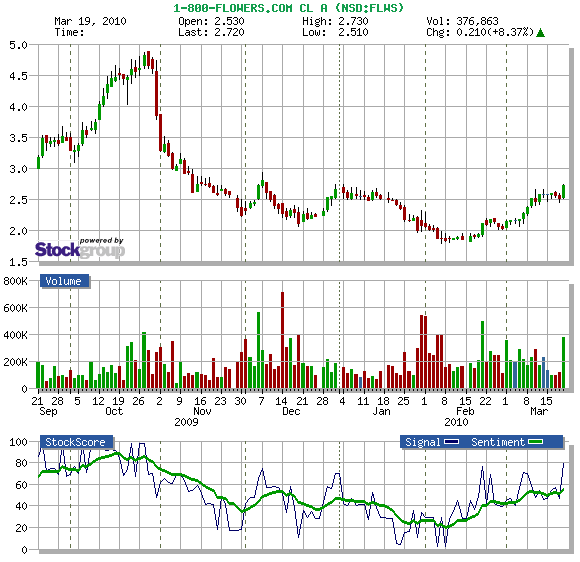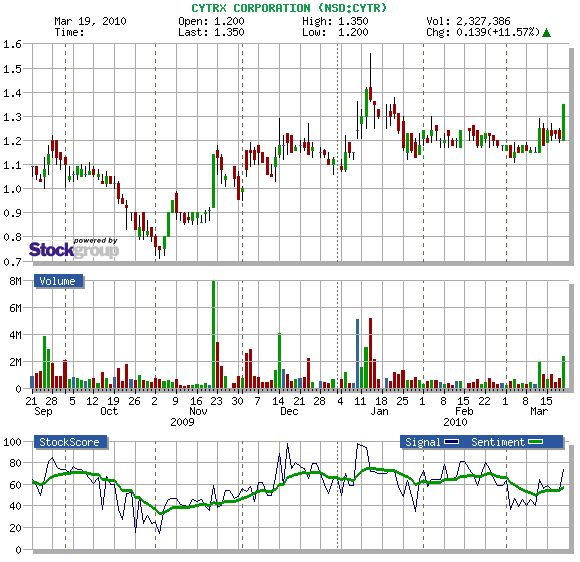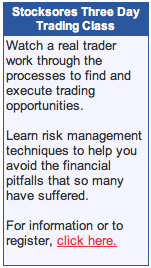Stockscores.com Perspectives for the week ending March 21, 2010
In this week’s issue:
Weekly Commentary
Strategy of the Week
Stocks That Meet The Featured Strategy
![]()
When you think of the best run companies in the world, what names come to mind? Wal-Mart? Proctor and Gamble? Perhaps Apple? Think of the worst run companies and you might think of a company like Enron, which is now out of business because it was run so poorly.
What makes these large companies good or bad? If you believe the highly paid bankers of Wall Street, running a company well requires the best leadership. Of course, the best people also come at the highest price.
If we compare Wal-Mart, the world’s largest retailer and a model of incredible cost efficiency, with Enron, the once high flying energy firm that ultimately burned out on bad deals, we see that the price paid for leadership meant little. Wal-Mart executives, by Enron standards, are poorly paid. Enron sought the brightest and best and paid them very well. Wal-Mart grows their leadership internally and pays their highest earners with modest salaries. Enron went bankrupt despite their smart and talented people.
What is the difference, does money not buy quality?
With my very limited knowledge of either company, one thing that stands out to me is the difference in systems and processes that each employ. Every task that a Wal-Mart employee is clearly defined and modelled for success. Employees at Enron were allowed to sort of do what ever they thought would help the company succeed. A noble idea, but the lack of standards allowed for individual goals to take priority to the detriment of the company.
From this example, it seems that plan and process take precedence over talent. A disciplined, highly calculated and planned business is able to do well even though it may not have the smartest people running the business. Talent is over rated.
And so it goes for trading.
I have taught aspiring traders from every possible background. The well educated and the drop outs, Mensa level IQs and those who might be referred to as not the brightest bulb on the tree. I have taught those who have already achieved financial success and those who are in pursuit of that dream.
And what stands out, after teaching a few thousand people, is that there is nothing about a person’s background that predicts trading success. When trading, anyone can succeed or fail.
So what does matter? At the very top of my list would be process. Having a detailed, well tested and constructed plan for making money in the market is a must. Every aspect of the plan must be well thought out and based on experience. The more steps in the trader’s plan that are left to human judgement, the greater the chance that the plan will achieve a poor result.
With a good plan, can anyone get the job done? If you ask Wal-Mart, the answer is probably yes. They hire thousands of people to do the various jobs that they employ and could not possibly expect that talent will allow each employee to get the job done. Their people succeed because their jobs are well defined.
What is important is how the tasks are defined. Wal-Mart succeeds in part because they have so much retailing experience. Their employees and management use their experience and resources to develop the very best processes. With those processes, even people who lack experience or talent are able to succeed.
This is exactly how it works for traders. I have seen so many successful and bright people fail in the stock market simply because they did not have the experience to develop the right plan.
Think about what you do in your career. Is your job hard?
Most people would answer no to this question since doing their job is what they are experts at. To the surgeon who has performed 1000 surgeries, the 1001st surgery is not particularly difficult. For the person who has never done one, it is a great and dangerous challenge, no matter how smart they are.
Does this mean that anyone can succeed as a trader if given a good trading plan? No, at least no better than anyone could succeed at removing your wisdom teeth if given a step by step process for doing it. You still need to practice the plan before you can achieve success.
Having a planned process helps us shorten the time it takes to learn something. The Wal-Mart employee or the surgeon can each do their job well by combining a good plan with some time for practice. The Enron employee might have had better success if they had a good plan to work from.
If you do not have a trading plan, stop trading. You might argue that you have done really well in the market over the past couple of months and you therefore do not need a plan. I would respond with some of the examples of people who gave back all their profits and more when the stock market was not working in their favour. A trending market can make the inexperienced look like they know what they are doing.
You can either create your own plan or you can buy one from someone who has put in the time to create a good one. I think that everyone should try to create their own plan because you learn a lot by doing so but, in the interest of time and money, buying a plan is a pretty good investment and a cheaper way to find success.
Your plan must be written down. It must be tested. It must be practiced. All trading plans should evolve with the market and as you gain experience. They need not be complex, simplicity in a plan usually works best. Plan the trade and trade the plan.
![]()
The word Alpha is something that gets a lot of attention among traders. If you want to beat the market, you have to trade Alpha. This week, I was asked what that really means. Let me explain what it means to trade Alpha and then offer a way to do so.
Every stock’s performance has some correlation to the overall market. If the S&P 500 is going up, most stocks will also go up. The relationship between an individual stock’s performance and the overall market can be defined using linear regression. From this analysis, the stock’s Beta and Alpha components are calculated. The Beta is the correlation that the stock has to the market index. A stock with a Beta of 1 is expected to move at the same pace and direction as the market index. With a Beta of 2, the stock should move in the same direction but with twice the intensity as the market.
Alpha is the part of a stock’s performance that is not correlated to the overall market. A stock with a Beta of 1 that returns 10% when the market returns 1% has made an abnormal return of 9%. This abnormal return is the Alpha since the stock was expected to return only 1% based on its historic correlation to the overall market.
I have found that the easiest way to trade Alpha is to find abnormal price and volume action. If price change is greater than normal for the stock and it is accompanied by higher trading volumes than normal, then there is likely something driving the company to trade on its own story.
The Stockscores Market Scan has two filters to help us find abnormal trading activity. Under the Price Filters section of the tool is a filter for Abnormal Activity and under Volume Filters is one for Abnormal Volume. Use these to find the stocks that are trading abnormally.
This week, I ran a scan with Abnormal Price set to Abnormal Day Up and Abnormal Volume set to Abnormal Volume. So that I would only get stocks that trade with some liquidity, I set the Number of Trades filter to >= 200. With this scan, I found the following trading opportunities:
![]()
1. FLWS
There was buying late in the day on Friday in FLWS and that took the stock through some resistance and out of a cup and handle pattern. Looks good so long as it can hold above support at $2.52.

2. CYTR
Most of the buying pressure came in the last half an hour on CYTR and that took the stock up through resistance to close near the high of the day. Support is at $1.19.

Click HERE if you want to learn from some of the timeless advice from some of worlds best traders including the very successful Tyler Bollhorn.
References
Get the Stockscore on any of over 20,000 North American stocks.
Background on the theories used by Stockscores.
Strategies that can help you find new opportunities.
Scan the market using extensive filter criteria.
Build a portfolio of stocks and view a slide show of their charts.
See which sectors are leading the market, and their components.
Tyler Bollhorn started trading the stock market with $3,000 in capital, some borrowed from his credit card, when he was just 19 years old. As he worked through the Business program at the University of Calgary, he constantly followed the market and traded stocks. Upon graduation, he could not shake his addiction to the market, and so he continued to trade and study the market by day, while working as a DJ at night. From his 600 square foot basement suite that he shared with his brother, Mr. Bollhorn pursued his dream of making his living buying and selling stocks.
Slowly, he began to learn how the market works, and more importantly, how to consistently make money from it. He realized that the stock market is not fair, and that a small group of people make most of the money while the general public suffers. Eventually, he found some of the key ingredients to success, and turned $30,000 in to half a million dollars in only 3 months. His career as a stock trader had finally flourished.
Much of Mr Bollhorn’s work was pioneering, so he had to create his own tools to identify opportunities. With a vision of making the research process simpler and more effective, he created the Stockscores Approach to trading, and partnered with Stockgroup in the creation of the Stockscores.com web site. He found that he enjoyed teaching others how the market works almost as much as trading it, and he has since taught hundreds of traders how to apply the Stockscores Approach to the market.
Disclaimer
This is not an investment advisory, and should not be used to make investment decisions. Information in Stockscores Perspectives is often opinionated and should be considered for information purposes only. No stock exchange anywhere has approved or disapproved of the information contained herein. There is no express or implied solicitation to buy or sell securities. The writers and editors of Perspectives may have positions in the stocks discussed above and may trade in the stocks mentioned. Don’t consider buying or selling any stock without conducting your own due diligence.
Disclaimer
This is not an investment advisory, and should not be used to make investment decisions. Information in Stockscores Perspectives is often opinionated and should be considered for information purposes only. No stock exchange anywhere has approved or disapproved of the information contained herein. There is no express or implied solicitation to buy or sell securities. The writers and editors of Perspectives may have positions in the stocks discussed above and may trade in the stocks mentioned. Don’t consider buying or selling any stock without conducting your own due diligence.



